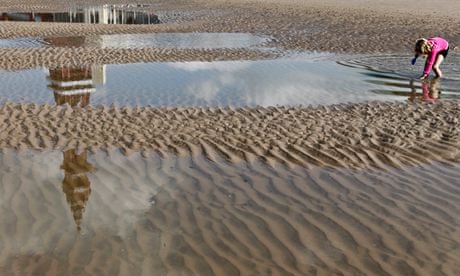Dozens of beaches around England could fail new stricter sewage standards for water quality, including Blackpool, Clacton, Morecambe and Margate. While 90% of the nation's beaches meet cleanliness standards, 46 suffer from sewer overflows, manure running off from farms and badly connected toilets in coastal homes and businesses. The result can be swimmers suffering gastroenteritis and eye or ear infections.
The official bathing season, when the water at 420 popular beaches is monitored, began on 15 May, and the Environment Agency (EA)is set to take weekly samples to test for faecal bacteria. Significant improvements have been made since 1990, when one in five beaches failed the UK's basic standard, with 99% passing in 2013.
But recent research on infection risk has led the EU to set a new standard from 2015 which is twice as stringent. It requires local authorities to put up a sign advising against swimming at beaches that do not pass the standard. Other beaches at risk of failing the standard, based on 2013 data, are Budleigh Salterton, Hastings, Ilfracombe, Scarborough, Southend and Teignmouth.
"Meeting tough new water quality targets has been a huge challenge, and local authorities, water companies, farmers, homeowners and businesses all have important parts to play in protecting and improving bathing water quality at the remaining beaches that are not yet up to scratch," said Paul Hickey, the EA's deputy director of water quality. He said clean water is vital as tourists spend £3.6bn every year visiting beaches.
Causes of pollution include sewage overflows, where heavy rain washes untreated waste into the sea, and slurry and other farm animal waste being washed into rivers and streams.
Some action has been taken at Morecambe Bay, where water company United Utilities has built 1,000 cubic metres of storm sewage storage. At Combe Martin in north Devon, changes to farming practices meant water quality passed the basic standard for the first time in 2013.
Another problem is domestic toilets that have been mistakenly connected to the surface drainage system, into which rain gutters also flow, instead of the sewage system.
In some regions, 20% of homes have their drains misconnected, according to the EA, meaning sewage is unintentionally flushed into rivers and ends up on beaches.
At Torbay, home to 15 designated bathing spots, battling dirty water required more than 130 wrong connections to be fixed in homes, a large hotel, a church hall and other buildings. Christine Tuckett, from the EA, said repairs were challenging. "It's not great [for owners] as there's often a cost involved," she said. "But if you live near the sea you are probably getting some income from the local economy, so the persuasion side is not always so hard."
She said: "A lot of the improvement across England since 1990 was due to water company investment. But a lot of that big stuff has now been done and now it's the more difficult stuff."
Tuckett said those wanting to swim should seek up-to-date water quality information on their chosen beach on the EA website or a free smartphone app. She said pollution often peaked after heavy rain, as waste is flushed down to the sea. "But for the majority of the time, our beaches have good bathing water quality," she said. "So go out and enjoy them."

Comments (…)
Sign in or create your Guardian account to join the discussion